Courtesy: Time Magazine- By YUSUF JAMEEL / SRINAGAR Wednesday, Jun. 10, 2009
The Vale of Kashmir is simmering again, this time over the rape and alleged murder of two young Muslim women. The corpses of 17-year-old Aasiya Jan and her sister-in-law, Nilofar Shakeel, 22, were found floating in a shallow stream on May 30, hours after t heir disappearance from their family's apple orchards in the city of Shopian in Indian Kashmir. Locals have alleged that Indian soldiers from a military encampment in the neighborhood were involved in the violent acts, reigniting separatist calls in the Muslim-majority region. At least one protester was killed and more than 300 people have been wounded in pitched street battles between angry residents and police that have brought the scenic Himalayan region to a standstill for over a week.
heir disappearance from their family's apple orchards in the city of Shopian in Indian Kashmir. Locals have alleged that Indian soldiers from a military encampment in the neighborhood were involved in the violent acts, reigniting separatist calls in the Muslim-majority region. At least one protester was killed and more than 300 people have been wounded in pitched street battles between angry residents and police that have brought the scenic Himalayan region to a standstill for over a week.
Autopsy reports and forensic investigations have confirmed that Aasiya and Nilofar, who was pregnant, were both raped, but authorities have not yet confirmed that either woman was murdered. A special police team has been assigned to the investigation. So far, no charges have been made, but chief minister of Indian-administered-Kashmir Omar Abdullah has said the government is committed to finding the perpetrators of the violent crime. "Nilofar and Aasiya were like my sisters and I, as brother, feel the pain of the tragedy that has befallen the victim family," Omar said. He pledged not to rest till the perpetrators are brought to justice. The Indian army and other security forces have not yet responded to residents' allegations.
Those assurances have failed to cool down tempers. The unrest has sparked Kashmiri separatists' call for azadi — "freedom" — once again, recalling scenes from a decades-long insurgency that has claimed many thousands of lives. In the first weeks of June, the streets of Srinagar and elsewhere have been filled with hundreds of men and women demanding independence from Indian rule. Syed Ali Shah Geelani, 79, a longtime separatist known for his hard standpoint on the issue of Kashmir, was quick to seize on the incident to mobilize protesters for his cause. He was arrested along with other key voices in the movement, most of whom have since been detained under a tough law called the Public Safety Act and shifted to jails outside the Valley. Several hundred average "troublemakers" have also been put behind the bars in the much-criticized sweep by police. Kashmir's chief minister Omar Abdullah has defended the action. "They took advantage of the tragic Shopian incident and plunged people into further misery," he told the Greater Kashmir newspaper.
Despite the relative peace that has come to Kashmir in recent years, anti-India sentiment still runs deep in predominantly Muslim Indian state. Some separatist leaders continue to seek full independence for the state; others a plebiscite to determine whether Kashmir should fall under Indian or Pakistani rule. Incidents like the Shopian deaths often lead high-voltage clashes between the region's residents and Indian security forces. Abdullah, Kashmir's chief, admits that absolute peace and normalcy will evade the region unless a sustained peace dialogue takes place within the state and between New Delhi and Islamabad. "New Delhi ought to talk to all the stakeholders including separatist leaders in Kashmir. Simultaneously, [India's] dialogue with Pakistan must be resumed without delay." he said.
This week's uproar is reminiscent of a similar situation that unfolded last summer after the state government decided to transfer about 100 acres of land to a Hindu consortium. The move was designed to improve amenities for the thousands of Hindus who come to Kashmir each year to worship at a local cave-shrine. More than 60 people were killed in the protests that followed that policy. Incidents like these take both a personal and an economic toll: Hundreds of Indian and foreign tourists were driven out of the Valley this week, and tour operators say that many bookings for tours and weddings — a big business in this scenic spot — have been cancelled. "More or less, three thousand marriages have been postponed or cancelled over the past one week," says Farooq Ahmed Bhandari, a chef who caters traditional wedding banquets. (Read about the 2008 clashes.)
The opposition has been quick to point out the government's failings in dealing with the crisis. Former chief minister and leader of opposition People's Democratic Party (PDP), Mufti Muhammad Sayeed, says the official "mishandling" of the Shopian incident caused its escalation. Some Kashmir watchers also say that the chief minister's early response to the Shopian incident — that there was no evidence of foul play and that the women had likely drowned — got him into trouble. That statement was apparently based on early police information that the autopsy revealed no marks of violence on the dead bodies. But as local television channels continued to loop footage of the victims' bodies in abject condition, surrounded by mourning relatives who squarely placed blame on the Indian troops, the lingering feelings of a decades-long conflict once again surfaced.
Mufti the former chief minister, says the region and its people will continue to suffer economic and personal losses in incidents unless Indian armed forces are recalled from populated areas and the laws which give them impunity are repealed. In a letter to Prime Minister Dr. Manmohan Singh, he asserted that the effort that had gone into creating a new atmosphere of peace, reconciliation and resolution in and around Indian-administered-Kashmir "seems at a real risk of going waste unless immediate retrieval is made." Ostensibly in an acknowledgement of the situation being serious enough, Indian home (interior) minister P Chidambaram has scheduled a visit to Srinagar later during this week.
Mirwaiz Umar Farooq, Kashmir's chief Muslim cleric and a moderate face of separatist movement, agrees with Mufti — though only partly. "Complete peace and normalcy will return to Kashmir and rest of the South Asian region only when the core issue of Kashmir is resolved as per wishes and aspirations of its people," says Farooq. Dr. Sheikh Showkat Hussain, a political analyst and a professor of law at the Kashmir University, agrees: "It is the virus and not the symptoms which require to be taken care of."
The Vale of Kashmir is simmering again, this time over the rape and alleged murder of two young Muslim women. The corpses of 17-year-old Aasiya Jan and her sister-in-law, Nilofar Shakeel, 22, were found floating in a shallow stream on May 30, hours after t
 heir disappearance from their family's apple orchards in the city of Shopian in Indian Kashmir. Locals have alleged that Indian soldiers from a military encampment in the neighborhood were involved in the violent acts, reigniting separatist calls in the Muslim-majority region. At least one protester was killed and more than 300 people have been wounded in pitched street battles between angry residents and police that have brought the scenic Himalayan region to a standstill for over a week.
heir disappearance from their family's apple orchards in the city of Shopian in Indian Kashmir. Locals have alleged that Indian soldiers from a military encampment in the neighborhood were involved in the violent acts, reigniting separatist calls in the Muslim-majority region. At least one protester was killed and more than 300 people have been wounded in pitched street battles between angry residents and police that have brought the scenic Himalayan region to a standstill for over a week.Autopsy reports and forensic investigations have confirmed that Aasiya and Nilofar, who was pregnant, were both raped, but authorities have not yet confirmed that either woman was murdered. A special police team has been assigned to the investigation. So far, no charges have been made, but chief minister of Indian-administered-Kashmir Omar Abdullah has said the government is committed to finding the perpetrators of the violent crime. "Nilofar and Aasiya were like my sisters and I, as brother, feel the pain of the tragedy that has befallen the victim family," Omar said. He pledged not to rest till the perpetrators are brought to justice. The Indian army and other security forces have not yet responded to residents' allegations.
Those assurances have failed to cool down tempers. The unrest has sparked Kashmiri separatists' call for azadi — "freedom" — once again, recalling scenes from a decades-long insurgency that has claimed many thousands of lives. In the first weeks of June, the streets of Srinagar and elsewhere have been filled with hundreds of men and women demanding independence from Indian rule. Syed Ali Shah Geelani, 79, a longtime separatist known for his hard standpoint on the issue of Kashmir, was quick to seize on the incident to mobilize protesters for his cause. He was arrested along with other key voices in the movement, most of whom have since been detained under a tough law called the Public Safety Act and shifted to jails outside the Valley. Several hundred average "troublemakers" have also been put behind the bars in the much-criticized sweep by police. Kashmir's chief minister Omar Abdullah has defended the action. "They took advantage of the tragic Shopian incident and plunged people into further misery," he told the Greater Kashmir newspaper.
Despite the relative peace that has come to Kashmir in recent years, anti-India sentiment still runs deep in predominantly Muslim Indian state. Some separatist leaders continue to seek full independence for the state; others a plebiscite to determine whether Kashmir should fall under Indian or Pakistani rule. Incidents like the Shopian deaths often lead high-voltage clashes between the region's residents and Indian security forces. Abdullah, Kashmir's chief, admits that absolute peace and normalcy will evade the region unless a sustained peace dialogue takes place within the state and between New Delhi and Islamabad. "New Delhi ought to talk to all the stakeholders including separatist leaders in Kashmir. Simultaneously, [India's] dialogue with Pakistan must be resumed without delay." he said.
This week's uproar is reminiscent of a similar situation that unfolded last summer after the state government decided to transfer about 100 acres of land to a Hindu consortium. The move was designed to improve amenities for the thousands of Hindus who come to Kashmir each year to worship at a local cave-shrine. More than 60 people were killed in the protests that followed that policy. Incidents like these take both a personal and an economic toll: Hundreds of Indian and foreign tourists were driven out of the Valley this week, and tour operators say that many bookings for tours and weddings — a big business in this scenic spot — have been cancelled. "More or less, three thousand marriages have been postponed or cancelled over the past one week," says Farooq Ahmed Bhandari, a chef who caters traditional wedding banquets. (Read about the 2008 clashes.)
The opposition has been quick to point out the government's failings in dealing with the crisis. Former chief minister and leader of opposition People's Democratic Party (PDP), Mufti Muhammad Sayeed, says the official "mishandling" of the Shopian incident caused its escalation. Some Kashmir watchers also say that the chief minister's early response to the Shopian incident — that there was no evidence of foul play and that the women had likely drowned — got him into trouble. That statement was apparently based on early police information that the autopsy revealed no marks of violence on the dead bodies. But as local television channels continued to loop footage of the victims' bodies in abject condition, surrounded by mourning relatives who squarely placed blame on the Indian troops, the lingering feelings of a decades-long conflict once again surfaced.
Mufti the former chief minister, says the region and its people will continue to suffer economic and personal losses in incidents unless Indian armed forces are recalled from populated areas and the laws which give them impunity are repealed. In a letter to Prime Minister Dr. Manmohan Singh, he asserted that the effort that had gone into creating a new atmosphere of peace, reconciliation and resolution in and around Indian-administered-Kashmir "seems at a real risk of going waste unless immediate retrieval is made." Ostensibly in an acknowledgement of the situation being serious enough, Indian home (interior) minister P Chidambaram has scheduled a visit to Srinagar later during this week.
Mirwaiz Umar Farooq, Kashmir's chief Muslim cleric and a moderate face of separatist movement, agrees with Mufti — though only partly. "Complete peace and normalcy will return to Kashmir and rest of the South Asian region only when the core issue of Kashmir is resolved as per wishes and aspirations of its people," says Farooq. Dr. Sheikh Showkat Hussain, a political analyst and a professor of law at the Kashmir University, agrees: "It is the virus and not the symptoms which require to be taken care of."










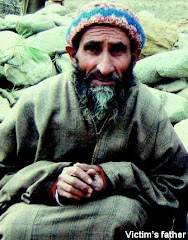



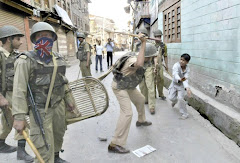


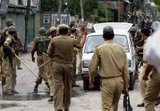



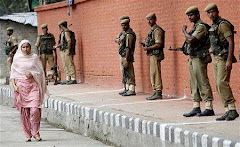







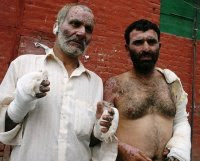






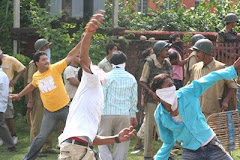

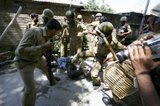




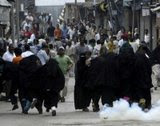







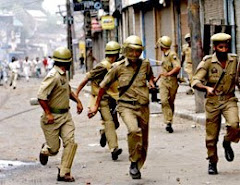
No comments:
Post a Comment